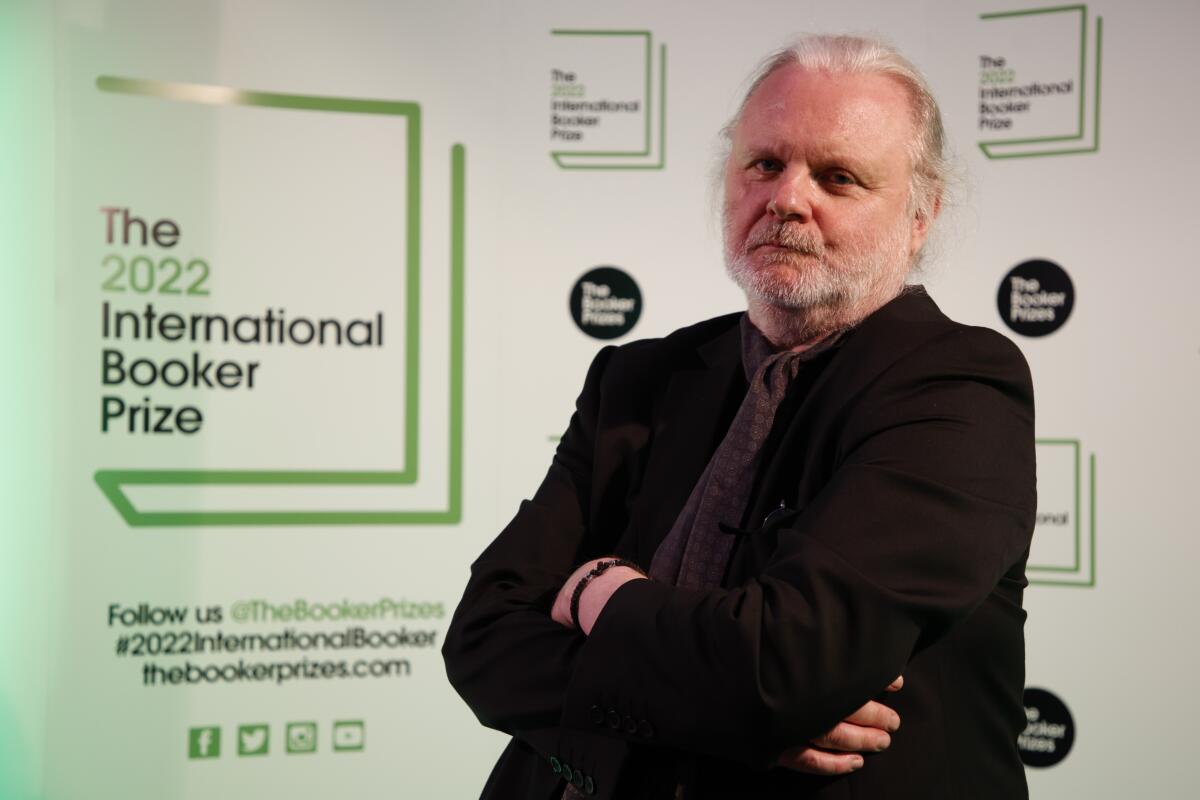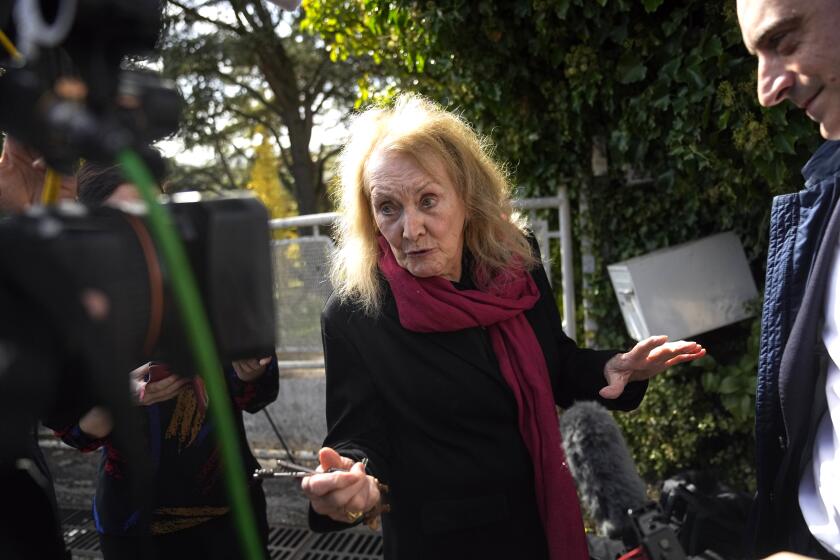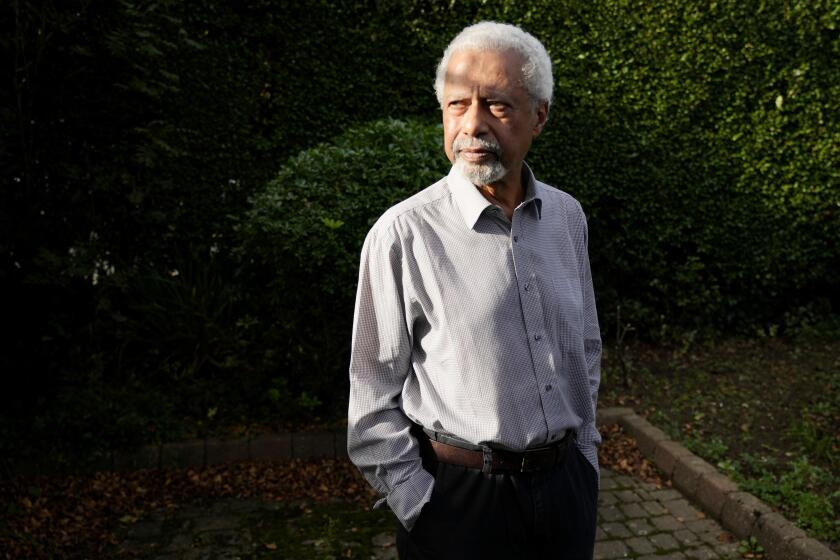Norwegian playwright and author Jon Fosse wins the Nobel Prize in literature

- Share via
STOCKHOLM — Norwegian writer Jon Fosse, a master of spare Nordic literature in a sprawling oeuvre that includes plays, novels and children’s books, won the Nobel Prize in literature Thursday for works that “give voice to the unsayable.”
Anders Olsson, chairman of the Nobel literature committee, said Fosse’s impressive output is rooted “in the language and nature of his Norwegian background.”
One of his country’s most-performed dramatists, Fosse said he had “cautiously prepared” himself for a decade to receive the news that he had won.
“I was surprised when they called, yet at the same time not,” Fosse, 64, told Norwegian public broadcaster NRK. “It was a great joy for me to get the phone call.”
The author of 40 plays as well as novels, short stories, children’s books, poetry and essays, Fosse was honored “for his innovative plays and prose which give voice to the unsayable,” according to the Swedish Academy, which awards the prize.
Fosse has cited the bleak, enigmatic work of Irish writer Samuel Beckett — the 1969 Nobel literature laureate — as an influence on his minimalist style.
Yes, awarding the Nobel Prize in literature to Ernaux, a chronicler of illegal abortion, is a political move. But it’s also a victory for literature
His first novel, “Red, Black,” was published in 1983, and his debut play, “Someone Is Going to Come,” in 1992. His major prose works include “Melancholy”; “Morning and Evening,” whose two parts depict a birth and a death; “Wakefulness”; and “Olav’s Dreams.”
His plays, which have been staged across Europe and in the United States, include “The Name,” “Dream of Autumn” and “I Am the Wind.” His work “A New Name: Septology VI-VII,” described by Olsson as Fosse’s “magnum opus,” was a finalist for the International Booker Prize in 2022.
Fosse has also taught writing — one of his students was best-selling Norwegian novelist Karl Ove Knausgaard — and consulted on a Norwegian translation of the Bible.
Mats Malm, permanent secretary of the academy, announced the prize in Stockholm. Malm said that he reached Fosse by phone to inform him of the prize and that the writer was driving in the countryside and promised to drive home carefully.
The Nobel Prize has lifted up a deserving chronicler of postcolonial displacement. Here’s a guide to getting started on his work.
Fosse is the fourth Norwegian writer to win the Nobel but the first in nearly a century, following Bjornstjerne Bjornson in 1903, Knut Hamsun in 1920 and Sigrid Undset in 1928.
Fosse writes in Nynorsk, one of the two official standards of written Norwegian, chiefly spoken in and around Bergen, where he lives. It is used by just 10% of Norway’s 5.4 million people, according to the Language Council of Norway, but completely intelligible alongside the other written form, Bokmaal.
Guy Puzey, senior lecturer in Scandinavian Studies at the University of Edinburgh in Scotland, said Bokmaal is “the language of power, it’s the language of urban centers, of the press,” while Nynorsk is used mainly by people in rural western Norway.
“So it’s a really big day for a minority language,” he said.
Sign up for our Book Club newsletter
Get the latest news, events and more from the Los Angeles Times Book Club, and help us get L.A. reading and talking.
You may occasionally receive promotional content from the Los Angeles Times.
In recognition of his contribution to Norwegian culture, Fosse was granted use of an honorary residence in the grounds of the Royal Palace, which is owned by the Norwegian state.
“A great recognition of outstanding authorship that makes an impression and touches people all over the world,” Prime Minister Jonas Gahr Store wrote on X, formerly known as Twitter. “All of Norway offers congratulations and is proud today!”
In a statement released by his publishing house, Samlaget, Fosse said he saw the prize “as an award to the literature that first and foremost aims to be literature, without other considerations.”
Last year, French author Annie Ernaux won the prize for what the prize-giving Swedish Academy called “the courage and clinical acuity” of books rooted in her small-town background in the Normandy region of northwest France.
Nobel Prize winners Katalin Karikó and Drew Weissman harnessed messenger RNA, an advance that led to the Pfizer and Moderna COVID-19 vaccines.
Ernaux was just the 17th woman among the 119 Nobel literature laureates. The literature prize has long faced criticism that it is too focused on European and North American writers, as well as too male-dominated.
In 2018, the award was postponed after sex abuse allegations rocked the Swedish Academy, which names the Nobel literature committee, and sparked an exodus of members. The academy revamped itself but faced more criticism for giving the 2019 award to Austria’s Peter Handke, who has been called an apologist for Serbian war crimes.
The Nobel Peace Prize will be awarded Friday and the economics prize Monday.
The prizes carry a cash award of 11 million Swedish kronor ($1 million). The money comes from a bequest left by the prize’s creator, Swedish inventor Alfred Nobel, who died in 1896.
More to Read
Sign up for our Book Club newsletter
Get the latest news, events and more from the Los Angeles Times Book Club, and help us get L.A. reading and talking.
You may occasionally receive promotional content from the Los Angeles Times.













